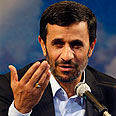
Document reveals scope of EU trade with Iran
While European countries talk of imposing harsher economic sanctions on Iran, Foreign Ministry document obtained by Ynet shows trade ties very much intact, with Germany, Italy and France in the lead
Europe boasts of its efforts to foil the Iranian nuclear program, but in reality has been trading with the Islamic Republic in the amount of some €65 billion (roughly $91 billion) in the past three years.
The leading countries in trade with Iran include Spain, France, Italy, Holland and Belgium, a document obtained by Ynet that has been circulating in the Foreign Ministry and based on European Union numbers showed.
Calls for harsher sanctions against Iran in hopes of stopping its nuclear armament continue to increase. Among other things, Prime Minister Benjamin Netanyahu discussed the matter with German Chancellor Angela Merkel during his visit to Germany last week.
France has also adamantly demanded that Iran put an end to its nuclear program, and has threatened harsher sanctions if it fails to do so.
However, the document circulating in the Foreign Ministry shows that these very same countries continue to maintain extensive trade ties with Tehran estimated at billions of euros per year.
This means that even if European governments do seek sanctions against Iran, they are likely to be faced with opposition from the hundreds of thousands of employees of companies that trade with Iran whose livelihood may suffer.
According to the data presented in the document, between January and July of 2009, trade between the 27 European Union countries and Iran amounted to some €10 billion (about $14 billion).
While this is a decline compared to the same period in 2008, when trade amounted to €14.5 billion (around $20 billion), it is still a significant amount, which could make it difficult for these countries to impose economic sanctions on Tehran.
The drop in trade in 2009 compared to 2008 was mainly a result of the global economic crisis, but was also affected by European Union countries' policies aimed at cutting back on trade with Iran amid the diplomatic dispute.
In 2007, trade between the European countries and Iran amounted to some €24 billion (around $33.7 billion) and in 2008 reached nearly €26 billion ($36.5 billion), almost a 7% increase.
European export to Iran amounted to some €11 billion ($15.4 billion) in 2007, and around €11.5 billion ($16.7 billion) in 2008. Import stood at some €14 billion ($19.6 billion) in 2007 and some €14.5 billion ($20.3 billion) in 2008.
In the first half of 2009, European import from Iran stood at some €4 billion ($5.6 billion), and export amounted to around €6 billion ($8.4 billion).
Germany, Italy leading in trade with Iran
The scope of trade with Iran by country, from the largest to the smallest, shows that in the first half of 2009 Germany was at the top of the chart with over €2 billion ($2.8 billion) in trade with Iran. Italy came in second with similar numbers, and France following with €1.46 billion ($2 billion) in trade with Iran.
Next came Holland, with €1.3 billion ($1.8 billion), followed by Spain, with €1.2 billion ($1.7 billion).
However, the decline in trade between the EU and Iran in 2009 should be noted. The overall numbers of import and export last year showed a 31% drop in the first half of the year.
The country with the steepest decline in trade with Iran was Greece, with a 67% drop. Next was Portugal, with a 65% decline in trade with the Islamic Republic, and Finland with a 60% drop.
With regards to import from Iran, a 48.5% general drop was recorded in the first half of 2009. The leading country to cut back on import from Iran was Portugal, with a 70% decline in import, and was followed by Romania with a 58% drop, and France with a 57% drop.
The decline of exports from the European Union during the first half of 2009 was less dramatic. No country, in the wake of the economic crisis, was able to allow itself to cut back on exports.
The data in the hands of the Israeli Foreign Ministry shows a decline of around 8.2% in exports to Iran in the time period of January to July, 2009.
A number of countries even increased trade with Iran, including the Czech Republic, Estonia, Hungary and Poland.
The data shows that many European nations, despite extolling additional sanctions on Iran, do business worth billions of euro a year with the country. This will no doubt hinder their ability to impose sanctions without doing harm to their own markets.
Many of these states are still in the grips of an economic crisis, which will render the move all the more difficult, and it appears the EU as a whole will have trouble supporting additional economic sanctions on Iran.










